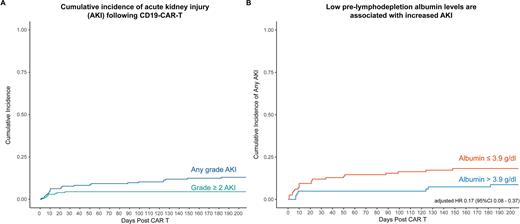Abstract
Background: Chimeric Antigen Receptor (CAR) T cells directed against CD19 induce durable remissions in patients with relapsed or refractory large cell lymphoma (LBCL), but many patients experience treatment-related toxicity. Cytokine release syndrome (CRS), immune effector cell-associated neurologic syndrome (ICANS), and hematologic toxicity are extensively characterized. However, limited data exist on the burden, predictors, and implications of acute kidney injury (AKI) after CAR T cell therapy.
Methods: In this single-center real-world retrospective study, we analyzed baseline (pre-lymphodepletion) and dynamic changes in renal function in adult patients with relapsed or refractory LBCL treated with CD19 CAR T cells. Estimated glomerular filtration rate (eGFR) was calculated via the 2021 CKD-EPI Creatinine Equation. Chronic kidney disease grading was tiered by the Kidney Disease Improving Global Outcomes (KDIGO) definitions. Serum creatinine values from day -5 through day 180 were used to assess AKI, which was defined by KDIGO criteria. Outcomes were measured from the first day of lymphodepletion. For AKI assessment, disease relapse or progression, anticancer treatment after CAR T cells, and death were considered competing events.
Results: We included 200 LBCL patients with a median age of 66 (IQR 20-86) that were treated with CD19 CAR T cells (50% axicabtagene ciloleucel, 32% tisagenlecleucel, 18% lisocabtagene maraleucel) between 2016 and 2022. At baseline, most patients (54%) had a normal eGFR (eGFR ≥90 mL/min) followed by grade 2 CKD (eGFR 60-89 mL/min) in 34% and grade 3 CKD (eGFR 30-59 mL/min) in 12%. Patients with decreased renal function were more likely to be older (p < 0.001) and received CAR T cells with a 41BB costimulatory domain (p=0.028).
In a cause-specific Cox model, baseline renal dysfunction was associated with an increased risk for severe neutropenia after CAR-T cell infusion (eGFR 60-89 vs. eGFR ≥90 mL/min; HR 1.53 [95% CI, 1.08-2.17]; p = 0.018). Pre-lymphodepletion eGFR was however not associated with overall survival (OS; p = 0.25), progression-free survival (PFS; p = 0.62), CRS grade 2+ (p = 0.34), or ICANS grade 2+ (p = 0.59). The cumulative incidence of day 180 AKI at any grade and grade 2+ AKI was 14% [95% CI 9.3 - 19%] and 4.5% [95% CI 2.2 - 8%], respectively (Figure 1A). At day 180, 14 of 83 (17%) evaluable patients had an eGFR <60.
In a univariable cause-specific Cox regression model, baseline lower hemoglobin (p = 0.01) and albumin levels (p < 0.001) and higher ferritin (p = 0.005) and LDH levels (p = 0.05) were associated of AKI; no association was detected with baseline renal function (p = 0.47). Serum albumin remained significant in a multivariable model for AKI (HR 0.17 [95%CI 0.08 - 0.37], p < 0.001; Figure 1B). In a subset of patients with extensive cytokine profiling (n=50), pre-lymphodepletion log transformed IL6 was strongly associated with AKI (HR 3.59 [95% CI 1.19 - 10.8]). Finally, patients who developed any AKI through day 180 had significantly lower PFS (HR 2.13 [95% CI 1.35-3.37]; P=0.001) and OS (HR 2.01 [95% CI 1.22-3.31]; P=0.006).
Conclusions: In this largest study to date on renal injury in CAR T patients, we find acute kidney injury as a common complication of CAR-T cell therapy, exceeding 10%. The association between renal injury and subsequent mortality suggests that AKI is a clinically and prognostically significant complication. The discovery that readily available biomarkers reflecting physiological reserve, disease burden, and systemic inflammation inform on renal injury risk may support personalized stratification for risk mitigation.
Disclosures
Slingerland:Seres Therapeutics: Other: salary support through a sponsored agreement. Scordo:Kite - A Gilead Company: Other: Ad-hoc advisory board (past); Amgen, Inc.: Research Funding; Angiocrine Bioscience, Inc.: Consultancy, Research Funding; Omeros Corporation: Consultancy, Research Funding; McKinsey & Company: Consultancy; i3Health (CME): Honoraria; Medscape, LCC (CME): Honoraria. Batlevi:Bristol-Myers Squibb: Other: Ownership / Equity Interests; Provision of Services; ADC Therapeutics: Other: Provision of Services; Dava Oncology: Other: Provision of Services; Autolus: Research Funding; Bayer: Research Funding; Epizyme: Research Funding; Janssen: Research Funding; Novartis: Research Funding; Roche/Genentech: Research Funding; Xynomic: Research Funding; GLG Pharma: Consultancy; Juno/Celgene: Consultancy; Kite Pharma: Consultancy; Life Sciences: Consultancy; Seattle Genetics: Consultancy. Giralt:Janssen: Membership on an entity's Board of Directors or advisory committees; Actinuum: Membership on an entity's Board of Directors or advisory committees, Research Funding; SPECTRUM Pharma: Membership on an entity's Board of Directors or advisory committees; OMEROS: Research Funding; TAKEDA: Membership on an entity's Board of Directors or advisory committees, Research Funding; MILTENYI: Research Funding; Novartis: Membership on an entity's Board of Directors or advisory committees; Kite: Membership on an entity's Board of Directors or advisory committees; Jazz Pharmaceutical: Membership on an entity's Board of Directors or advisory committees; Johnson & Johnson: Membership on an entity's Board of Directors or advisory committees, Research Funding; Amgen: Membership on an entity's Board of Directors or advisory committees, Research Funding; Celgene: Membership on an entity's Board of Directors or advisory committees, Research Funding. Palomba:Ceramedix: Consultancy; BeiGene: Consultancy. Salles:Roche/Genentech, Gilead Sciences, Janssen, Celgene, Novartis, MorphoSys AG, Epizyme, Alimera Sciences, Genmab, Debiopharm Group, Velosbio, Bristol-Myers Squibb, BeiGene, Incyte, Miltenyi Biotec, Ipsen, Kite, a Gilead Company, Loxo, Rapt: Consultancy; AbbVie, BeiGene, Bristol Myers Squibb, Celgene, Debiopharm, Epizyme, Genentech/Roche, Genmab, Incyte, Kite, a Gilead Company, Miltenyi, MorphoSys, Takeda, and VelosBio: Membership on an entity's Board of Directors or advisory committees; Roche/Genentech, Janssen, Celgene, Gilead Sciences, Novartis, AbbVie, MorphoSys AG, Amgen, Bayer, Epizyme, Regeneron, Kite, a Gilead Company: Honoraria. Shah:Beyond Spring: Research Funding; Amgen: Research Funding; Janssen: Research Funding. Perales:VectivBio AG: Honoraria; Miltenyi Biotec: Consultancy, Honoraria; Nektar Therapeutics: Consultancy, Honoraria; Novartis: Honoraria; Omeros: Consultancy; Orca Bio: Consultancy; Merck: Consultancy; Kite, a Gilead Company: Honoraria, Research Funding; Sellas Life Sciences: Consultancy; Medigene: Consultancy; Servier: Consultancy; Bellicum: Honoraria; Incyte: Honoraria, Research Funding; DSMB: Other; Bristol-Mysers Squibb: Honoraria; Takeda: Honoraria; MorphoSys: Consultancy, Honoraria; Karyopharm: Honoraria; Celgene: Honoraria; Astellas: Honoraria; Abbvie: Honoraria; Cidara Therapeutics: Consultancy; Vor Biopharma: Honoraria. Shouval:MyBiotics: Consultancy; Medexus: Consultancy, Ended employment in the past 24 months.
Author notes
Asterisk with author names denotes non-ASH members.


